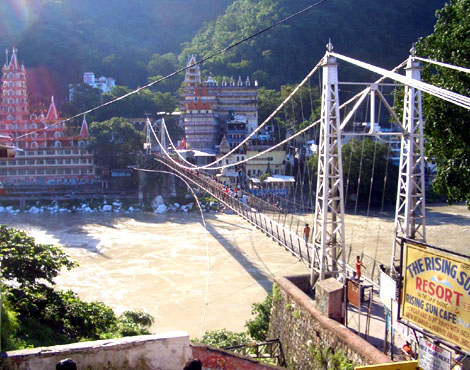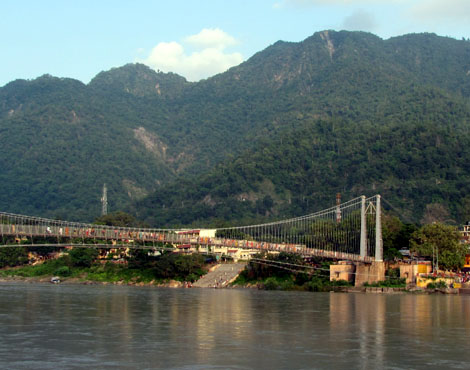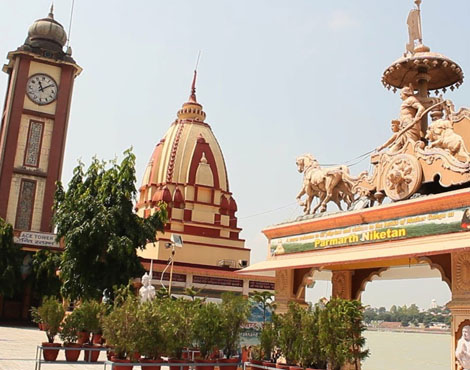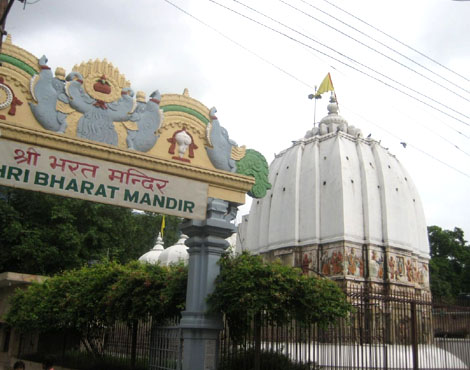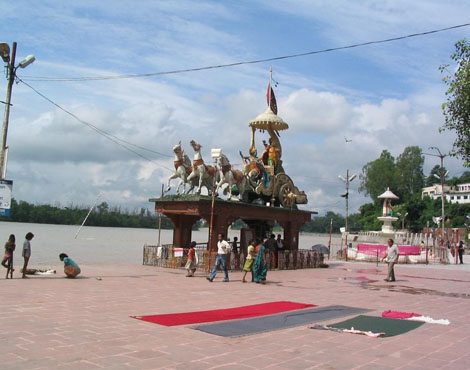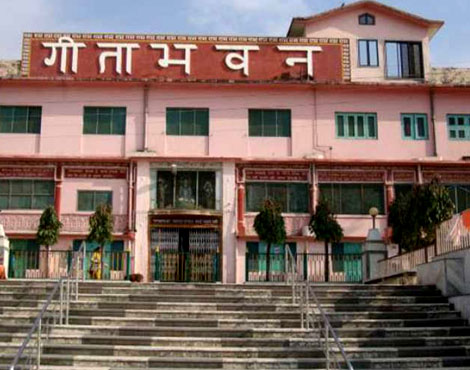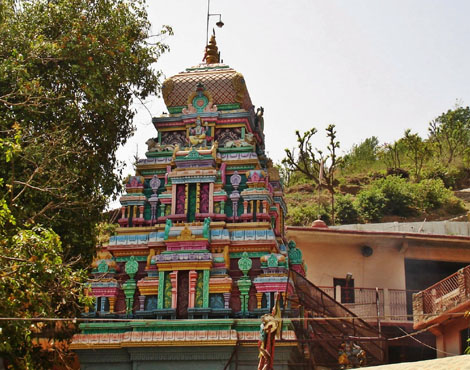Explore Rishikesh
The holy town of Rishikesh has the eminence of being the International capital of Yoga and meditation. Located in the foothills of the Himalayas on the banks of the River Ganges, Rishikesh is dotted with a number of ancient temples, ashrams and world renowned yoga and meditation centres. Not only devotees, but travellers from all parts of the world flock to the sacred town for a deeper understanding of meditation.
Evening in Rishikesh are for sitting by the Ganges and while away your time. Later in the evening, you headed towards Parmarth Niketan Ashram to witness the daily evening ritual of Ganga Aarti. The aarti is a pleasant ritual of worshipping the Ganga. Around 50-100 people visit the aarti on any day.
Laxman Jhula in Rishikesh is one of the major tourist attractions for those
who visit Rishikesh. Basically, it is a hanging bridge across river Ganga,
around 450 ft long and 70 ft above the river. In early times, the jhula was a
hanging jute bridge, but later it was transformed into an Iron suspension
bridge. The bridge is used as a path to visit Swarg Ashram and Gita Bhavan.
The bridge is known to be of mythological importance and is connected with great
Hindu epic, Ramayana. If legends are to be believed the bridge is named after
Lakshman, the brother of Lord Rama. It is said that he had crossed the river
from same spot using a long jute rope. Till 1924, the bridge was still a rope
bridge that was washed away in floods.
Ram Jhula is Iron suspension bridge connect on the waterway Ganga in
Rishikesh. Ram Jhula interfaces Muni Ki Reti with Swargashram. The scaffold is
person on foot connect yet individuals likewise drive bicycles on it. There are
two comparative extensions in Rishikesh. The old one is known as Lakshman Jhula.
Ram Jhula is new one so it is named after Lakshman's sibling Lord Ram.
Ram Jhula is add up to 230 meters in length. Ram Jhula is one of two most
celebrated vacationer regions in Rishikesh (another is Lakshman Jhula). The vast
majority of the acclaimed ashrams are found near the Ram Jhula. Sivananda
Ashram, Parmarth Niketan, Gita Bhawan, Yog Niketan and numerous others are
situated close to the Ram Jhula. Both end of the extension has little market
with numerous kind of shops.
Parmarth Niketan is an ashram located on next of the holy Ganges and in the
lap of the Himalayas. Ashram is just next to the Ganges you can go to the Ganges
by walk they have his own private ghat. Ashram will provide his entire pilgrims
a sacred and peaceful atmosphere for his guests who came all over the world.
With over 1,000 rooms, the facilities are a perfect blend of modern amenities
and traditional, spiritual simplicity.
The inspiring beauty of the ashram, the clear flowing Ganga, the majestic
mountains, and the green forests will embrace and rejuvenate your entire being.
Parmarth Niketan offers comfort, inspiration and upliftment for your body, mind
and spirit as well as a deeper connection with the Divine.
Located in the heart of the city, Bharat Mandir is an ancient temple sacred
to Lord Hrishikesh Narayan, an incarnation of Lord Vishnu in Kaliyuga. The
temple sanctum houses a well-crafted idol of Lord Vishnu, which is carved out of
a single black stone, known as Saligram.
Legend has it that the idol of the temple was reinstalled in 789 AD on the day
of Basant Pamchmi. Ever since then, Saligram is taken out for a bath in Mayakund,
further, a grand procession marches through the streets till the temple for
reinstallation. Locals also say that whosoever does 108 parikramas
(circumambulation of sacred places) of Lord Hrishikesh Narayan on Akshaya
Tritiya will be blessed with their heart's desire and all their wished will be
fulfilled.
Triveni is a spot where three rivers meet. Triveni Ghat in Rishikesh is the
holy confluence of river Ganga, river Yamuna and river Saraswati. Devotees take
dip at the holy confluence to get rid of all sins committed and achieve
salvation.
Evening Aarti at Triveni Ghat is popular among the people of Dehradun, Haridwar,
whole of Uttarakhand, whole of India and the Hindu devotees outside India. you
will be enchanted with the floating diyas, flowers and the singing of sacred
Mantras and bhajans at TriveniGhat. The huge statue of lord Shiva sitting in
bull and the statue of Krishna-Arjun in chariot depicting the initiation of
Mahabharata war captivate you.
Geeta Bhawan. The Bhawan, at once, can accommodate more than 1000 devotees and
provides them free stay. Although the Bhawan remains crowded round the year, the
best time to visit is during summer for the day long Satsang programmes
organized by the devotees.
Geeta Bhawan provides pure vegetarian food, grocery items and Indian sweets,
free ferry ride and dispensary. Other amenities available at Geeta Bhawan
include Geeta Press book store, apparel shop and Ayurvedic department, which
sell pure herbal products. Inside the Bhawan, there is a sacred Banyan tree,
which was once the place where many saints like Swami Ramtirth, have performed
penance. Presently, the tree is considered as a haven for people seeking
spiritual enlightenment through yoga and meditation.
Neelkanth Mahadev Temple is a sacred and famous temple located at 32 km from
Rishikesh. Scenically situated on a hill at a height of 1330 mtrs, Neelkanth
Mahadev Temple is a one of the most popular temples of Lord Shiva. A famous
pilgrimage near Rishikesh, the temple lies above Swargashram adjacent to Nar
Narayan mountain range.
As per mythology, Neelkanth Mahadev Temple is a holy place where Lord Shiva
consumed the poison originated from ocean (Samudra Manthan) and placed in his
throat. This makes Lord Shiva's throat blue in colour and named Neelkanth. This
Mahadev Temple is best place for Lord Shiva devotees and people from far away
places visit this sacred place round the year. Maha Shivratri is celebrated in
Neelkanth Mahadev Temple with full rejoice and large number of devotees visit
the temple on this auspicious day.


